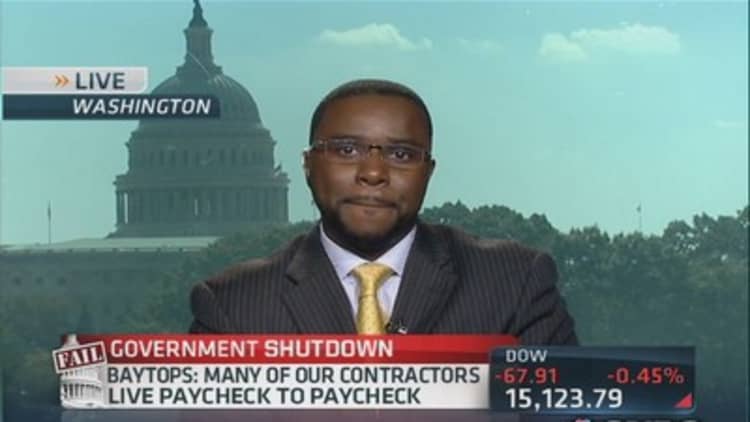The closure of national parks from sea to shining sea isn't just a disappointment to the millions of tourists who visit them each year. It's also a kick in the gut for the small business owners who run the shops and kiosks that depend on the tourists to stay in business.
"It's a horrifying proposition," said Ohwnn (her full name), who runs Tours in the Glades in Florida City. The company employs four seasonal guides and one year-round guide. If Everglades National Park stays closed longer than a week it could cost her company upward of $20,000.
"If the park stays closed, it's bankruptcy," Ohwnn said.
(Read more: 'Go for it': Kids help mom start family business)
Hundreds of small businesses serve the 278 million visitors to the National Park System. Though each business may have only a handful of employees, if tourists can't come to the parks because of the shutdown, those workers could be out of a job.
Fred Pagles, owner of Zion Cycles in Springdale, Utah, noticed a steady stream of traffic on the road Tuesday as visitors left Zion National Park.
He said he had to cancel reservations and turn away walk-ins. His shop can weather a shutdown, he added, but only for about a month, and he expects to lose several thousand dollars.
"We're a small business," said Pagles, who employs four. "For us it's a lot."

Nearby, the temporary closure of Arches National Park in Moab, Utah, has Julie Fox, the owner of the Eklecticafe, worried.
"Twenty percent of my yearly income comes from October and May," Fox said. "If it's anything like last time—21 days—I'll lay off eight out of 12 people. It'll be like the dead of winter here," she added, referring to the congressional budget battle that shut down national parks in December 1995.
Times are tighter this time around. The closure of the federal government comes amid one of the weakest recoveries from a recession since the Great Depression.
Though gross domestic product is higher than it was in 1995—$16.1 trillion versus $9.58 trillion—unemployment is, too, at 7.3 percent versus 5.4 percent.
That leaves small businesses, especially ones that rely on consumer leisure travel, more vulnerable to a crisis.
(Read more: Main Street's Obamacare dilemma)
Within the first hour of the official announcement of the shutdown, the Yosemite Miners Inn in Mariposa, Calif., had already received 10 cancellations.
"It's only going to grow from there," said General Manager Ceslie Brandon.
The timing couldn't have been worse. This is the busy season, and the inn relies on this business to get through the slower winter.
She's lost thousands of dollars already. "If this is any indication of what's to come," said Brandon, "we won't survive."
The business owners said the economic impact of the shutdown will reverberate beyond the walls of shuttered federal agencies.
"It goes so far beyond government employees," said bike shop owner Pagles. "They're all still going to get their paychecks, but everybody else ... is going to lose out. It's a very big ripple effect."
Even if the closures end up being brief, they can leave a lingering perception with potential visitors that can hurt business for the rest of the year.
"If there's any closure, you can't get the word out that it's open," said Lewis Evans, owner of the Kings Canyon Lodge near Sequoia and Kings Canyon National Park in California. His hotel persevered through the previous national park shutdown.
"Even if it were settled in a couple of days, 'the national parks are closed' is in everyone's mind," making it hard to draw customers back, he said.
The small business owners said they were disappointed in the budget negotiations in Washington.
"I'm not impressed whatsoever," Brandon said. "They need to really come together and get something passed."
Tour group owner Ohwnn called the process shameful. "They use our parks as a tool," she said, "and then they reopen."
Grace Bello contributed to this report.
—Follow Ben Popken on Twitter @bpopken.

